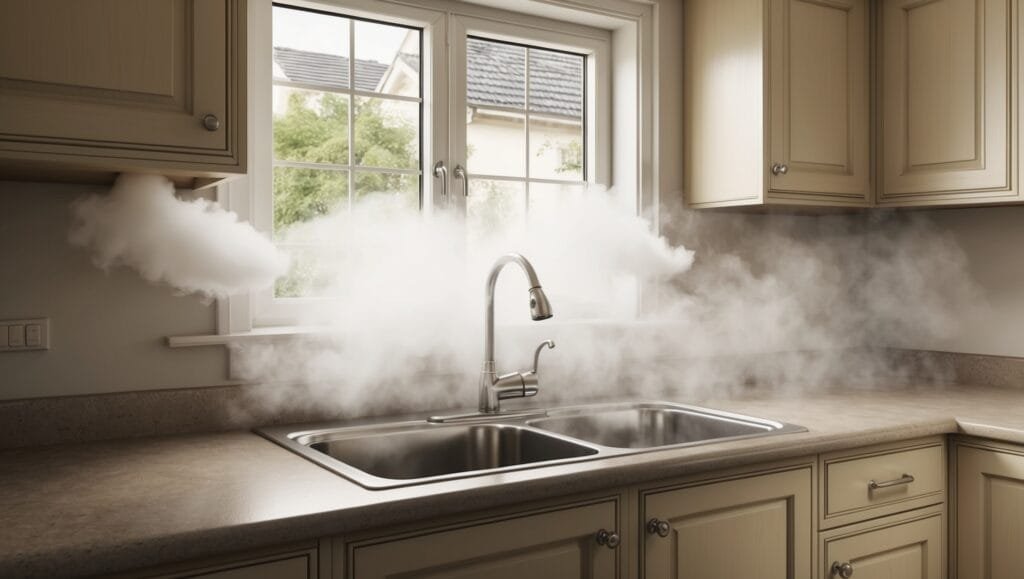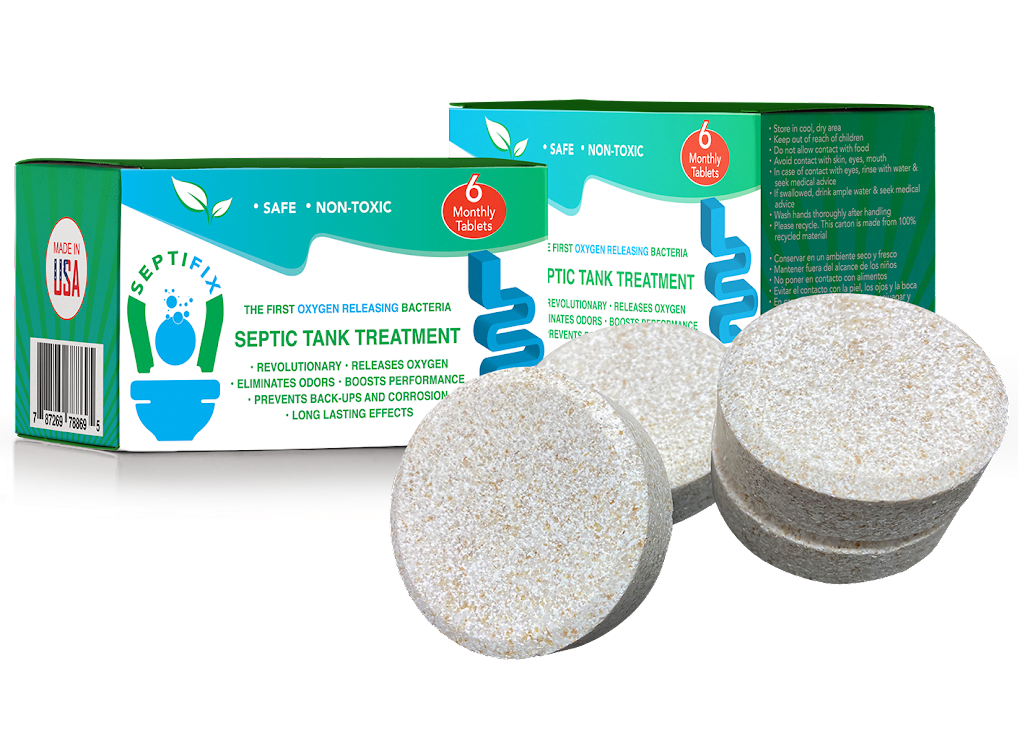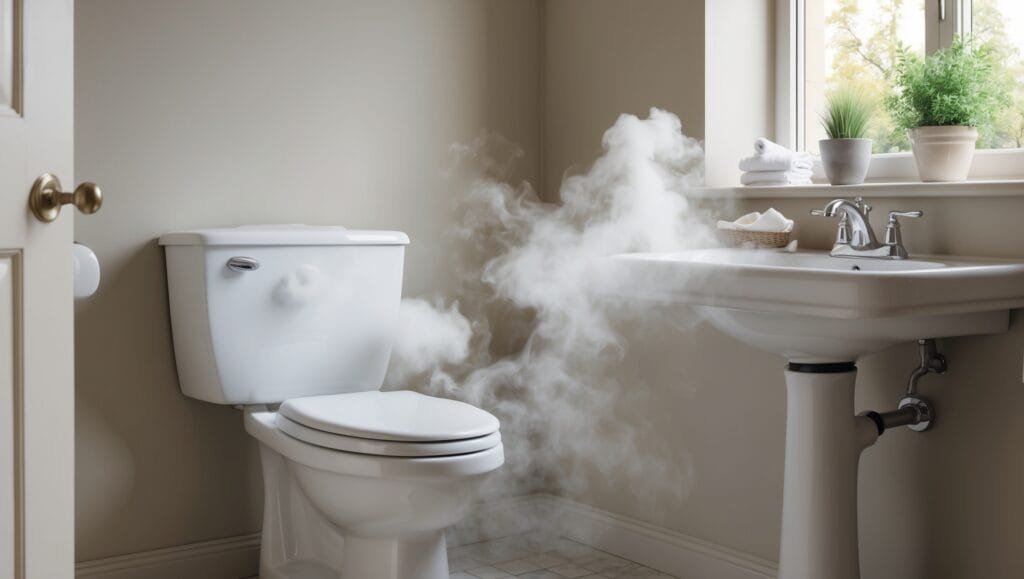Ever wondered why your home smells like sewage, even with a septic tank? A septic tank smell inside your home is not nice. It can happen when your septic tank isn’t working right. Things like dry drain traps or clogged vents can cause this smell.

It’s important to fix septic odor indoors fast. It might mean a bigger problem with your septic system. Cleaning your septic tank regularly can stop these smells. We’ll look at why septic tanks smell and how to make your home smell better.
Key Takeaways
- A good septic tank doesn’t make your home smell.
- Odors can come from dry drain traps, loose plugs, or clogged vents.
- Keeping the right pH in your septic tank helps waste break down.
- Regular pumping and inspections can stop smells.
- Using eco-friendly products and saving water helps your septic system.
Understanding Septic Tank Systems and Odors
Septic systems help manage wastewater for many homes, especially in rural areas. But, if they fail or aren’t kept up, they can cause bad smells. Knowing how septic systems work and what smells to watch for is key to fixing indoor odors.
How Septic Systems Work
A septic system has two parts: the septic tank and the leach field. Wastewater from the house goes into the tank. Inside, it separates into three layers.

SEPTIFIX will save you hundreds, if not thousands of dollars each year, because your septic system will run smoothly and you won’t have to worry about calling the pumpers or a plumber for a fix!
Click here to save up to 50%
- Scum layer: Grease and oils float to the top.
- Liquid layer: This is the middle, partially clear water.
- Sludge layer: Solid waste settles at the bottom.
The middle layer’s water flows to the leach field. This field has pipes that spread the water into the soil. The soil filters and treats the water, keeping it clean.
Common Septic Tank Odors
Septic systems should not smell bad when working right. But, problems can cause foul odors. Some common smells include:
- Rotten egg smell: This comes from hydrogen sulfide gas made by bacteria in the tank.
- Sewage odor: A strong smell can mean a backup or a full tank.
- Methane gas smell: Methane is odorless but can smell bad with other gases.
| Odor | Possible Cause | Solution |
|---|---|---|
| Rotten egg smell | Hydrogen sulfide gas production | Ensure proper ventilation and maintain septic tank pH levels |
| Sewage odor | Septic system backup or clogged drain | Pump septic tank and clear any clogs in the plumbing system |
| Methane gas smell | Anaerobic digestion process in septic tank | Ensure proper ventilation and regular septic tank maintenance |
Knowing about septic systems and common smells helps homeowners fix indoor odors. This keeps homes smelling fresh and healthy.
Identifying the Source of Septic Odors
When you smell rotten eggs at home, finding the source is key. The smell might come from plumbing inside or the septic system outside. Knowing where it comes from helps fix the problem and keep your home healthy.
Indoor Plumbing Issues
Plumbing problems inside can cause septic smells. Common issues include:
- Dry floor drain traps: If a drain trap dries out, septic gas can get in, making your home smell bad.
- Loose cleanout access plugs: If these plugs are loose or broken, septic gas can leak into your home.
- Clogged or blocked plumbing vents: Vents help air pressure and let gases out. If they’re blocked, septic gas builds up and gets in your home.
Outdoor Septic System Problems
Outdoor septic issues can also bring bad smells inside. Common problems include:
- Leaking septic tank manholes: If the manhole cover is not sealed or is broken, septic gas can leak in.
- Improper septic tank pH levels: If the tank’s pH is off, it can make too much hydrogen sulfide gas, causing the smell.
- Crushed or broken pipes: Damaged pipes can leak septic gas, making your home smell bad.
- Root infiltration in pipes: Tree roots can damage pipes, letting septic gas out and into your home.
- Saturated or failing leach fields: If the leach field is wet or not working, septic gas can back up into your home.
Knowing where the septic smell comes from helps fix it. It could be plumbing inside or the septic system outside. Fixing it keeps your air clean and your health good.
Plumbing Problems Causing Septic Odors
When you smell sewage from drains or septic odor in your bathroom, look for plumbing problems. Many plumbing issues can cause septic odors. This can make your home smell bad and might be harmful to your health. Let’s look at some common problems and how to fix them.

Dry Floor Drain Traps
Dry floor drain traps in basements often cause septic odors. The U-shaped bend in septic tank drains needs water to keep smells out. If the traps dry out, sewer gases can get into your home.
To fix this, run water through the drains often. This keeps the water barrier in the traps. Cleaning your drains regularly can also stop dry traps and bad smells.
Loose Cleanout Access Plugs
Loose or damaged cleanout access plugs can also let septic odors in. These plugs help with cleaning but can leak if they’re not tight. Check these plugs often and fix them quickly to stop odors.

SEPTIFIX will save you hundreds, if not thousands of dollars each year, because your septic system will run smoothly and you won’t have to worry about calling the pumpers or a plumber for a fix!
Click here to save up to 50%
For more information on how to fix these problems, read this article on common septic tank issues.
Clogged or Blocked Plumbing Vents
Plumbing vents on your roof are key for air pressure and letting gases out safely. But, if they’re clogged, it can cause bad smells inside. Clogged vents can also make your drains and toilets gurgle.
| Plumbing Issue | Symptoms | Prevention |
|---|---|---|
| Dry Floor Drain Traps | Sewage smell from drains | Run water periodically, maintain cleaning schedule |
| Loose Cleanout Access Plugs | Septic odor in bathroom | Regular inspections, prompt repairs |
| Clogged Plumbing Vents | Gurgling sounds, septic odors indoors | Regular cleaning of roof, gutters, and vent stacks |
To avoid vent stack clogs, clean your roof, gutters, and vents often. This keeps them working right and stops bad smells. In cold places like North Texas, ice can block vents too. So, watch for ice and clear it away.
Fixing these plumbing problems quickly and taking steps to prevent them can help. This keeps your bathroom smelling fresh. If smells keep coming back, get help from a professional plumber to find and fix the problem.
Septic Tank Issues Leading to Odors
When you smell a strong odor near your septic tank, it’s time to find out why. Leaking manholes and wrong pH levels in the tank are common problems. Fixing these can stop the bad smells and keep your septic system working right.
Leaking Septic Tank Manholes
Look at the manhole cover if you smell something bad. The seals can wear out, letting gases out and causing smells. Studies show up to 35% of septic smells come from these leaks.
Check the risers and manholes to make sure they’re tight. If you see cracks or gaps, use weather stripping to seal them. Keeping manholes in good shape helps keep smells out of your home and yard.
Improper Septic Tank pH Levels
Wrong pH levels in the tank can also cause bad smells. The pH should be between 6.8 and 7.6 for the system to work well. If it’s too acidic, it messes with the microbes that break down waste. This leads to hydrogen sulfide gas, smelling like rotten eggs.
| pH Level | Effect on Septic System |
|---|---|
| Below 6.8 | Acidic environment, disrupts microbial activity, strong odors |
| 6.8 – 7.6 | Optimal range for microbial activity, efficient waste breakdown |
| Above 7.6 | Alkaline environment, slows down waste decomposition |
To keep the pH right, follow these tips:
- Don’t use too much harsh cleaning stuff or chemicals
- Don’t flush things that won’t break down, like cigarette butts or wipes
- Check the pH levels often with test strips or ask a pro
Fixing leaking manholes and keeping pH levels in check can help a lot. If smells keep coming back or you think there’s a bigger problem, call a septic expert for help.
Leach Field and Drain Field Concerns
A little septic smell near the tank is okay. But, a strong smell from the leach field means trouble. The leach field treats wastewater and spreads it into the ground. Problems here can cause bad smells and health risks.
Crushed or Broken Pipes
Crushed or broken pipes in the leach field can cause smells. Pipes can get damaged by soil settling, heavy equipment, or tree roots. If pipes leak, wastewater can spread, making the yard smell bad. Call a plumber or septic expert if you think this is happening.
Root Infiltration in Pipes
Roots in pipes can also cause smells. Trees and shrubs can grow into pipes, blocking them. This lets wastewater leak into the soil, making it smell. Avoid planting trees near the leach field. Regular checks can catch and fix root problems before they cause big issues.
Saturated or Failing Leach Fields
A wet or failing leach field can also cause smells. Too much water or a bad septic system can make the soil too wet. This stops the soil from treating wastewater, making it smell bad. Look for water pooling, green plants, and a strong smell. A pro can help fix this by replacing the leach field or upgrading the septic system.
To learn more about septic solutions and plastic tanks, visit https://myseptictank.com/efficient-septic-solutions-plastic-tanks-for-modern-homes/.
Leaking sewage from a damaged or failing leach field is very dangerous. It should be fixed right away by a licensed expert to avoid health risks and harm to the environment.
Can Septic Tank Cause Odor in House?
Septic tanks can make a house smell bad. But, not all smells mean the tank needs to be pumped. Sometimes, the smell comes from plumbing or the environment.
Weather affects how we smell septic odors. On heavy air days, smells are more noticeable. This is because thick air holds odors, making them harder to get rid of.
Here are some common reasons for septic smells in the house:
- Drying out of traps in drains and unused fixtures
- Loose cleanout access plugs
- Dried out wax seals on toilets
Plumbing vent problems can also cause smells. In cold weather, vents might freeze, trapping odors inside. Clogged vents need cleaning to fix the smell.

SEPTIFIX will save you hundreds, if not thousands of dollars each year, because your septic system will run smoothly and you won’t have to worry about calling the pumpers or a plumber for a fix!
Click here to save up to 50%
“Down drafts from wind pattern changes can contribute to indoor odors, requiring raising the vent pipe on the roof to address.”
To find the source of septic smells, check plumbing, toilet seals, and sink joints. A smoke test can find where smells come from. Regular septic tank maintenance helps avoid these smells.
Dry drains can lead to septic gases in the home. Keeping water in the trap and cleaning pipes helps. Vent stack clogs also trap odors, needing cleaning to clear them.
In places like North Texas, cold weather can cause smells due to ice. Bad gaskets and seals around pipes and toilets can also cause odors. These should be checked and replaced if needed.
DIY Solutions for Septic Tank Odors
Homeowners can fight septic tank odors with simple DIY tricks. Keep the right pH levels, avoid bad products, and check manhole covers. This way, you can make your home smell nice.
Maintaining Proper pH Levels
Keeping the right pH in your septic tank fights odors well. The best pH is between 6.8 and 7.6. This helps good bacteria break down waste.

SEPTIFIX will save you hundreds, if not thousands of dollars each year, because your septic system will run smoothly and you won’t have to worry about calling the pumpers or a plumber for a fix!
Click here to save up to 50%
To keep pH right, pour a cup of baking soda down drains weekly. It’s a natural way to stop bad smells.
Avoiding Non-Biodegradable Products
Don’t flush non-biodegradable items down drains. They mess up your septic system and cause bad smells. Avoid flushing things like:
- Cigarette butts
- Feminine hygiene products
- Disposable wipes
- Dental floss
- Cotton swabs
Also, don’t put too much fat, oil, or chemicals in your septic system. They hurt the good bacteria and cause smells.
Inspecting and Sealing Manhole Covers
Check your septic tank’s manhole covers often. Cracks or damage let odors out. Fixing or replacing them keeps smells in.
| Septic Tank Maintenance Task | Frequency |
|---|---|
| Adding baking soda to drains | Once a week |
| Inspecting manhole covers | Every 3-6 months |
| Pumping out septic tank | Every 3-5 years |
DIY tricks can help manage septic odors. But, don’t forget to get professional help too. This keeps your septic system working well for a long time.
Professional Septic System Maintenance
DIY fixes can help with small septic tank odor problems. But, getting a pro to maintain your septic system is key. A good septic tank cleaning service and regular inspections keep your home smelling fresh.
Regular Septic Tank Pumping
Septic tank pumping is a big part of keeping your system healthy. Sludge and waste build up and can cause problems. A pro will pump out your tank every 3-5 years.
This keeps your system working right and stops bad smells.
Comprehensive System Inspections
Getting your septic system checked regularly is also important. A pro will look at your tank, pipes, and leach field. They check for leaks and damage that could cause odors or system failure.
Early detection saves money and keeps your system smelling good. It’s also a chance to learn how to take care of your septic system.
FAQ
Why does my septic tank smell inside my house?
A good septic tank doesn’t smell. If your home smells bad, it means there’s a problem. Gases like carbon dioxide and hydrogen sulfide can cause these smells. They might come from inside your plumbing or the septic system outside.
What are the most common septic tank odors?
You might smell rotten eggs, sewage, or methane. These smells are harmful and can be dangerous if they get too strong.
What indoor plumbing issues can cause septic odors?
Dry floor drain traps and loose cleanout plugs can let bad smells in. Clogged or blocked vents also let gases back into your home.
What outdoor septic system problems can lead to odors?
Leaking manholes and wrong pH levels in the tank can cause smells. Broken pipes, roots in pipes, and failing leach fields also lead to odors. These problems let sewage rise to the surface, making smells worse.
How can I reduce septic tank odors in my home?
To cut down on smells, keep the tank’s pH right by using baking soda. Don’t flush things that can’t break down. Check and seal manhole covers too. You can also extend the vent pipe or use a carbon filter to help get rid of odors.
How often should I have my septic tank cleaned to prevent odors?
Get a pro to clean your septic tank every 3-5 years. This keeps it working right and smelling good. Regular cleaning stops clogs and backups that cause bad smells.


